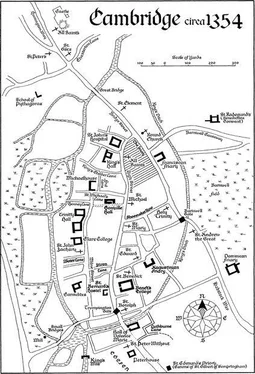One of the six students that Bartholomew had driven away from Faricius – the one whom Morden had called Bulmer – came to stand next to Ringstead, his demeanour hostile and sullen. Bartholomew wondered whether Bulmer was habitually disagreeable, or whether it was just the early morning visit from a proctor that prompted his unfriendly attitude. The physician hoped Bulmer was bound for a career at court, and that the Dominicans would not foist the ill-tempered lad on some unsuspecting village as parish priest.
‘We are terribly worried about Kyrkeby,’ said Ringstead. ‘He has never been missing for two days before.’
‘Have you reported his absence to the proctors’ office?’ asked Michael, irritable that he had yet another problem to solve. ‘I have beadles who are paid to hunt down missing scholars.’
Ringstead nodded. ‘Beadle Meadowman took details yesterday, and said he would ask the others to look for him on their patrols. Meanwhile, Prior Morden has gone to check the churches, to see if Kyrkeby is praying and has lost track of time.’
‘Is he a visionary, then?’ asked Michael, raising sceptical eyebrows. ‘Two days is a long time to be unaware of the passing of time. I would expect hunger to drive him from his prayers and back to his friary.’
‘Not all men are ruled by the calls of their stomachs,’ said Bulmer rudely, looking meaningfully at Michael’s ample girth.
‘Kyrkeby is a saintly man, and he might well be lost in contemplation somewhere,’ said Ringstead hastily, seeing Michael’s eyebrows draw together at the insult. He was older than Bulmer, and had the sense to realise that it paid to stay on the right side of the Senior Proctor. ‘He often wanders off to sit in churches.’
‘Of course, it is possible that the Carmelites have done something to him, in revenge for Faricius,’ said Bulmer, gazing at Michael with defiant eyes.
‘And what did you do to Faricius?’ Michael pounced.
Bulmer said impatiently, ‘That is not what I meant. We did nothing to him, but the Carmelites probably do not believe that.’
Michael sighed heavily. ‘Have you looked at Kyrkeby’s belongings, to see whether anything is missing? If he is as other-worldly as you say, he may have wandered off somewhere and simply forgotten to mention it to anyone.’
‘It was the first thing we did when we realised he was not here,’ said Ringstead. ‘There is nothing to indicate that he planned to leave the town. Quite the contrary, in fact: as we mentioned when you last came, he is due to give the lecture in St Mary’s Church on Sunday. He is looking forward to it enormously.’
‘He is going to speak in defence of nominalism,’ said Bulmer, throwing out the information in much the same way as he might a challenge to a fist fight.
Michael rubbed his chin. ‘So I understand. It is a rather controversial subject to choose.’
Ringstead raised his hands, palms upward. ‘That should not deter a good scholar, Brother. Indeed, controversial subjects must be better argued than dull ones, because there are more people looking for flaws in your logic.’
‘That is true,’ agreed Bartholomew. ‘My best-argued lectures are on medical issues that are new or unusual.’
‘But to choose nominalism, when there is already trouble between the Dominicans and the Carmelites, is irresponsible and self-indulgent,’ said Michael disapprovingly.
‘Scholarly disputation should never be a victim to narrow-minded bigotry,’ retorted Bulmer. ‘Just because the Carmelites are traditionalists and unwilling to change does not mean that reason and learning should stand still to accommodate them.’
‘I agree,’ said Bartholomew, neatly taking the wind out of his sails. ‘We would never progress in our understanding of the world if we were all too afraid to embrace new ideas.’
‘So when was the last time anyone saw Kyrkeby?’ asked Michael, impatient with the discussion and wanting to move on.
‘Monday afternoon,’ said Ringstead promptly. ‘He was working on his lecture, and had been avoiding a lot of his duties and obligations because of it. His absence in the refectory was what allowed the students to escape and march on the Carmelites last Saturday.’
‘I saw him on Monday afternoon,’ said Bartholomew. ‘He was ill, and I was late going to Edith’s house, because I was tending him.’
Ringstead nodded. ‘After you left, he continued to work on his lecture, and that was the last anyone saw of him.’
Michael sighed. He wanted to talk to Morden, not investigate the disappearance of a cleric who would undoubtedly show up when it suited him. ‘Show me Kyrkeby’s cell,’ he said reluctantly. ‘Perhaps you missed something that may give me a clue as to his whereabouts.’
Ringstead led the way, with Bulmer trailing them like some aggressive guard dog. Bartholomew glanced uneasily behind him, half expecting to feel teeth sink into one of his ankles.
Like the Carmelites’ dormitory, the Dominicans’ was divided into tiny cells, some more homely than others. Bartholomew supposed that it was difficult to impose too much poverty on ambitious young men destined for high positions in the King’s court or their Order, which explained why most of them boasted quarters that were so much more luxurious than his own.
Kyrkeby’s cell was larger than the others’, as befitted a man of his elevated office, and contained a handsome ironbound chest as well as a bed, a chair and a small table. Notes were scattered across the table, and a quick glance at them told Bartholomew that Kyrkeby had been working on his lecture there. Judging from the amount of crossings out and corrections on the numerous scraps of parchment, it was not something that had flowed easily.
Michael’s confidence in his ability to glance at a man’s possessions and identify his whereabouts was misplaced. There was nothing to indicate why – or even whether – Kyrkeby had disappeared, and Bartholomew wondered if the man realised that he had bitten off more than he could chew with his impending lecture, and had left the town before he could make a fool of himself. Perhaps his attack of illness on Monday had frightened him so much that he had decided not to risk his health further by going through what promised to be a tense and unpleasant occasion. He had certainly been agitated and out of sorts that day.
‘Does anyone know whether there is anything missing?’ asked Michael, becoming frustrated by the passing of time and the lack of progress. ‘Are all his clothes here, for instance?’
‘As far as we can tell,’ said Ringstead. ‘One of his cloaks has gone, but that tells us nothing, since he would wear it even if he were only going to the nearest church.’
‘He owns a lot of jewellery,’ added Bulmer irrelevantly. ‘Rings, crosses and so on.’
‘Does he?’ asked Michael. ‘And why would a Dominican have “rings, crosses and so on”?’
‘He has no more than anyone else,’ said Ringstead briskly, so that Bartholomew had the impression that Bulmer had just been told to shut up. Ringstead was in a difficult position, with his Prior and Precentor absent, and the reputation of the friary in his inexperienced hands.
‘And is any of this jewellery missing?’ asked Michael.
Ringstead opened a small drawer that was partly concealed under the table. In it were several rings, a jewelled hair comb and a fine selection of silver crosses.
Michael’s eyes were wide as he inspected them. ‘This is an impressive collection to be owned by a priest sworn to poverty. But you have not answered my question: is any of it missing?’
Ringstead shrugged. ‘I have no idea. You will have to ask Prior Morden that. He knows Kyrkeby better than I do.’
‘I expect Kyrkeby will turn up,’ said Michael, rubbing his hands together as though he imagined that was the end of the matter. ‘I will instruct my beadles to pay special attention to the churches tonight, and if he is in one, then they will find him. Perhaps he was so disappointed with the behaviour of his novices on Saturday that he wants nothing to do with you all.’
Читать дальше












